Introduction
The landscape of medical technology is rapidly evolving, underscoring the importance of pilot clinical studies in advancing innovative solutions. These studies serve as critical stepping stones in the development of new medical devices, enabling researchers to assess feasibility, gather preliminary data, and refine methodologies before larger-scale trials.
Navigating the intricacies of pilot studies requires a thorough understanding of various stages, including:
- Pre-study preparations
- Regulatory compliance
- Effective participant recruitment
- Data management
By adhering to established best practices and leveraging expert insights, stakeholders can enhance the rigor and relevance of their research efforts, ultimately contributing to improved healthcare outcomes and fostering international collaboration in the Medtech field.
Understanding the Stages of Pilot Clinical Studies for Medtech
Pilot clinical trials for medical technology typically encompass several essential stages that are vital for their success:
- Pre-Research Preparation: This foundational stage involves clearly defining the research objectives and selecting appropriate sites, alongside a strategic approach to participant recruitment. A meticulously crafted protocol is paramount, detailing the project's purpose, methodology, and expected outcomes. Considering that the median number of participants in pilot trials was found to be 76, as noted in a literature survey by Arain et al., it is essential to plan for sufficient recruitment to obtain statistically significant results. Furthermore, utilizing extensive clinical research management services provided by bioaccess®, encompassing feasibility assessments, site selection, and compliance evaluations, guarantees a strong research framework.
- Research Initiation: Following the preparatory phase, the investigation can commence. This stage includes training site staff on the protocol, securing necessary regulatory approvals from INVIMA—Colombia's National Food and Drug Surveillance Institute—and ensuring all materials and equipment are ready for implementation. Insights from regulatory guidance emphasize that while pilot studies improve research rigor, they are not essential for device approval, which usually requires only one well-controlled study. Effective site management at this stage can significantly influence the trial's overall quality and adherence to timelines.
- Information Gathering: During this critical phase, researchers meticulously collect information in alignment with the established protocol. Rigorous adherence to the protocol is essential for maintaining data integrity—any deviations can compromise the validity of the results. Recent guidance emphasizes focusing on descriptive statistics and estimation through confidence intervals rather than formal hypothesis testing, ensuring that findings are both practical and clinically relevant. The impact of such research extends beyond individual trials, contributing to economic growth and job creation in local communities. For example, ReGelTec's Early Feasibility Study on HYDRAFIL™ for treating chronic low back pain in Colombia exemplifies how Pilot Clinical Studies for Medtech in Paraguay can lead to innovative treatment solutions while positively impacting local economies.
- Data Analysis: Once data collection is complete, the analysis phase begins. This includes comprehensive statistical evaluations and interpretation of results to assess the efficacy and safety of the Medtech device. Utilizing surrogate endpoints can be advantageous in pilot trials, as they can provide early indications of treatment effects. For example, if a new device aims to enhance patient mobility, measuring changes in walking speed as a surrogate endpoint can help predict overall health outcomes, facilitating more efficient decision-making.
- Reporting and Dissemination: The final stage involves compiling the findings into a detailed report, which is then shared with stakeholders. This may involve presentations at relevant conferences or publication in peer-reviewed scientific journals. Effective communication of results is imperative not only for advancing medical knowledge but also for fostering further research initiatives. As emphasized by Spiegelhalter et al., various elicitation methods, including collecting insights from numerous experts, can improve the quality of reporting and interpretation of outcomes, especially when connected to specific phases of the pilot research process.
By navigating these essential phases carefully, alongside the expertise of partners like bioaccess® for expedited medical device trials, researchers can strengthen the rigor of their pilot projects and provide valuable insights to the field of medical technology, ultimately fostering international collaboration and healthcare advancement.
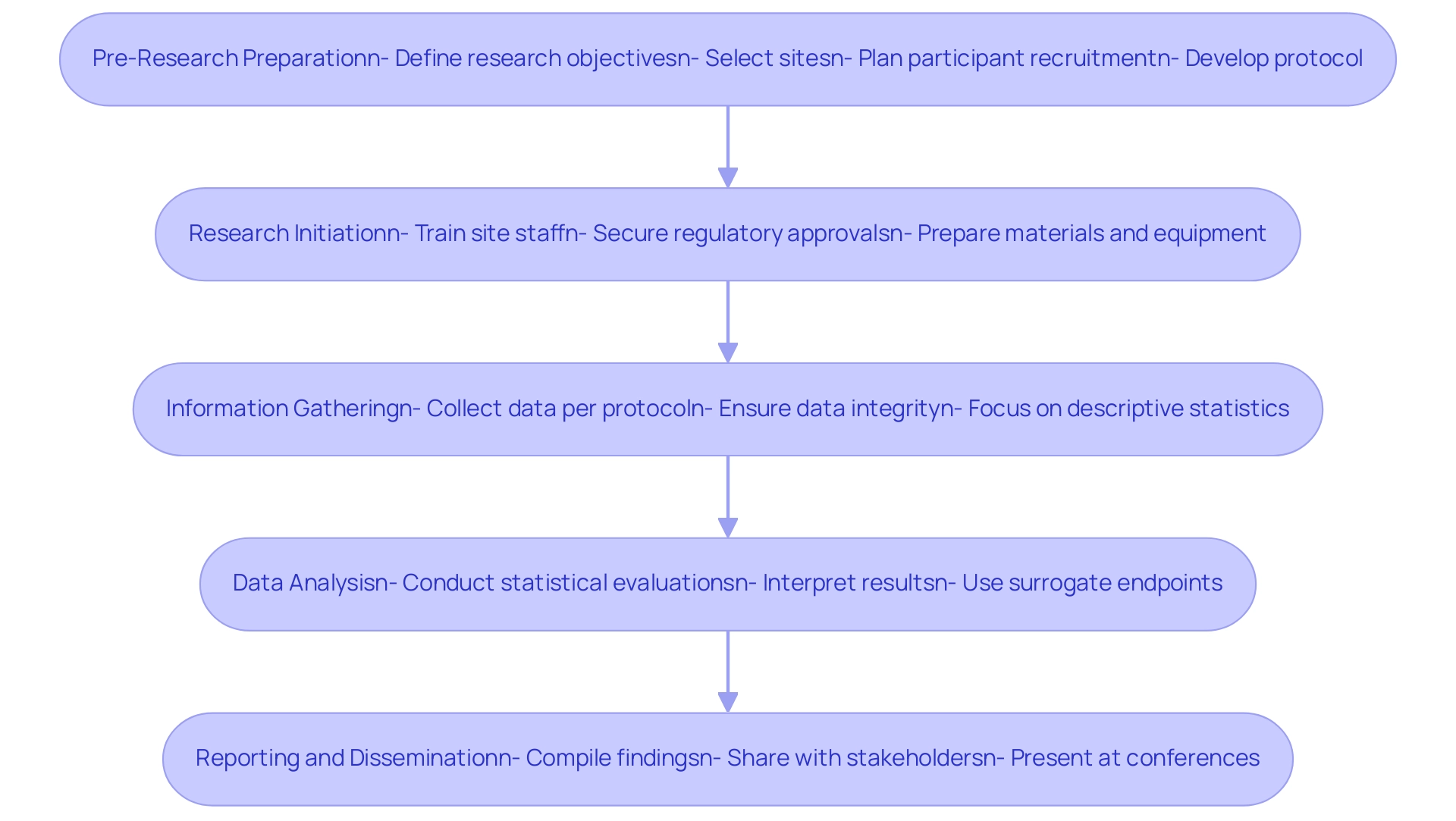
Navigating Regulatory Requirements for Clinical Trials in Paraguay
Conducting research trials in Paraguay necessitates careful adherence to a series of regulatory requirements that ensure both compliance and ethical integrity:
-
Authorization from Regulatory Bodies: Before starting any trial, researchers must obtain approval from the National Health Authority (ANVISA). This involves submitting a comprehensive research protocol along with all requisite documentation, including prior approvals and supporting materials that detail the proposed research.
- Ethics Committee Review: All clinical trials must undergo a thorough review by an ethics committee. This review protects the rights and welfare of participants by evaluating the ethical implications of the proposed research and ensuring adherence to local regulations. As mentioned by Julio G. Martinez-Clark, this streamlined approval process has made Paraguay an appealing location for medical device companies seeking to conduct Early Feasibility Studies (EFS) and First In Human (FIH) evaluations efficiently.
- Informed Consent Process: A robust informed consent process must be established, ensuring participants are fully apprised of the study's objectives, potential risks, and expected benefits prior to their enrollment. This transparency is crucial for ethical compliance and participant trust.
-
Adherence to Good Clinical Practice (GCP): Compliance with Good Clinical Practice guidelines is essential in Paraguay. GCP guarantees that research studies are carried out ethically, scientifically valid, and with the highest consideration for participant safety. This involves meticulous record-keeping and ongoing monitoring throughout the duration of the study.
- Reporting Adverse Events: Prompt reporting of any adverse events to regulatory authorities is mandatory. This requirement safeguards participant safety and maintains the integrity of the research endeavor.
In the context of research in Latin America, it's noteworthy that while 83% of projects are industry-sponsored, nations like Paraguay, Uruguay, and Cuba demonstrate a troubling lack of research activity. For example, Paraguay presently has only one cancer study, emphasizing considerable gaps in cancer research initiatives throughout the region. By utilizing bioaccess®'s extensive trial management services, including feasibility assessments, site selection, compliance evaluations, trial setup, project oversight, and reporting, researchers can effectively carry out pilot clinical studies for Medtech in Paraguay.
With over 20 years of experience in Medtech, bioaccess® not only paves the way for advancements in medical technology but also contributes to local economic growth, job creation, and improved healthcare outcomes, driving international collaboration and innovation in Medtech.
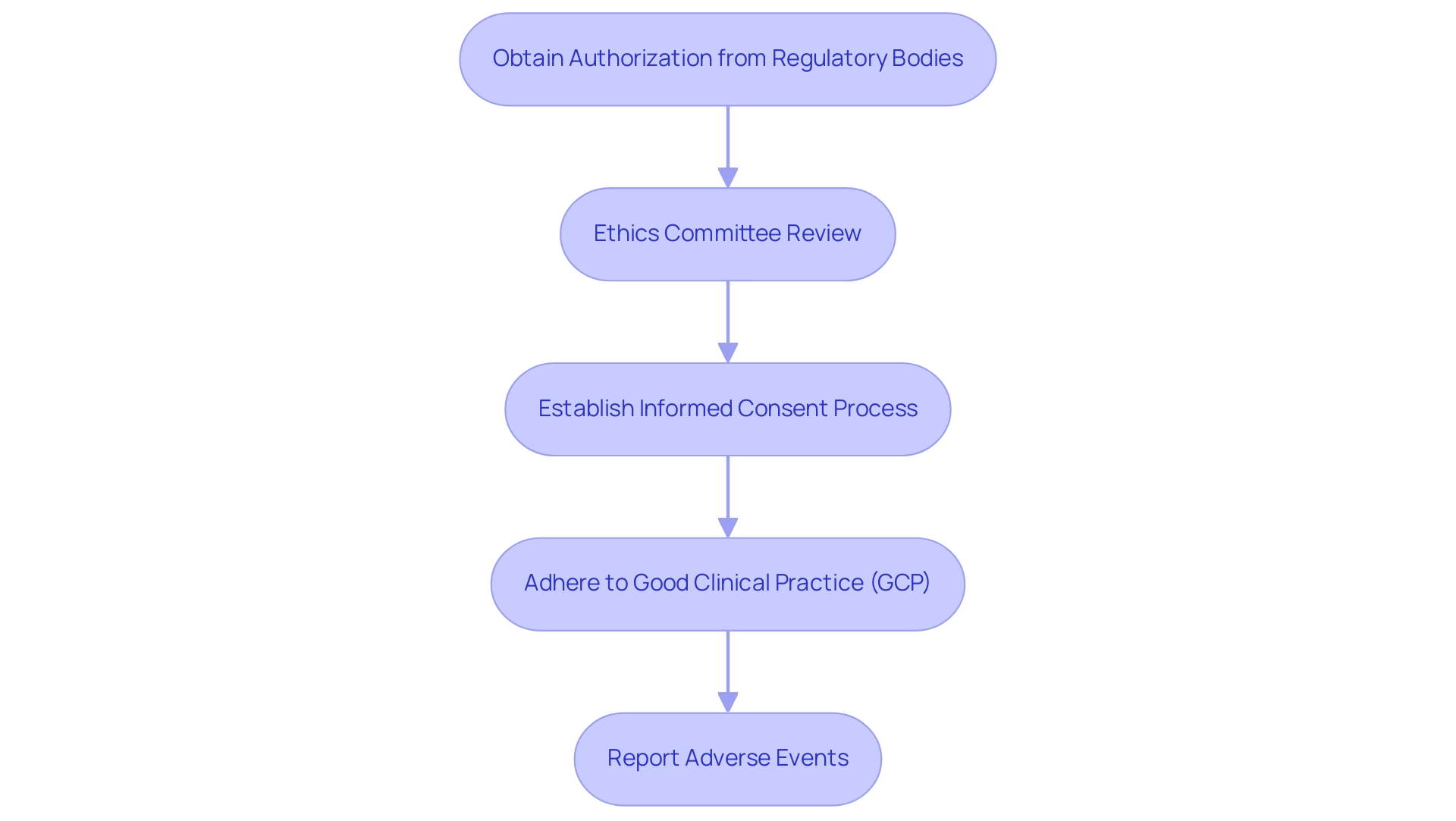
Recruiting Participants for Pilot Clinical Studies
To effectively recruit participants for pilot clinical studies, the following strategies should be considered:
- Define Inclusion and Exclusion Criteria: Establishing clear inclusion and exclusion criteria is vital. This process not only aids in identifying the appropriate population but also enhances the validity of research outcomes. As Jerome T. Galea states, "well-defined criteria can lead to more reliable results, as they ensure that the selected participants truly reflect the target demographic." By integrating this perspective, researchers can appreciate the critical role that precise criteria play in achieving trustworthy results.
- Utilize Multiple Recruitment Channels: Leveraging a variety of recruitment channels—including social media, community outreach, healthcare providers, and patient advocacy groups—can significantly enhance visibility and engagement. Recent trends indicate that diverse approaches are more effective in reaching potential participants, thus maximizing recruitment efforts.
- Engage with the Community: Establishing robust connections within local communities is essential for nurturing trust and readiness to take part in research. Hosting informational sessions allows researchers to educate potential participants about the study’s objectives and significance, thereby increasing participation rates. Successful examples of community engagement illustrate how trust can translate into higher recruitment numbers.
- Offer Incentives: Providing incentives, such as compensation of US $50 for participation in vignette testing, can effectively motivate individuals to join research studies. This compensation is not just a figure; it represents a tangible benefit that can encourage participation. The recent article 'Designing and using incentives to support recruitment and retention in clinical trials' highlights the positive impact of well-structured incentive strategies on recruitment rates. Moreover, the case analysis titled 'Next Steps for Incentive Strategies in Trials' emphasizes that innovative approaches to incentives are essential, especially given the ongoing challenges with recruitment and retention, indicating a need for further research to evaluate the effectiveness of different incentive schemes.
- Ensure Clear Communication: Transparency is key when conveying the research’s purpose, procedures, and potential risks to prospective participants. Transparent communication promotes trust and stimulates involvement, making it vital for successful recruitment in research trials. As highlighted by Grant et al. (2009), effective communication strategies can significantly influence participant perceptions and engagement.
By implementing these strategies, researchers can enhance participant recruitment for clinical trials, ultimately leading to more successful and impactful research outcomes.
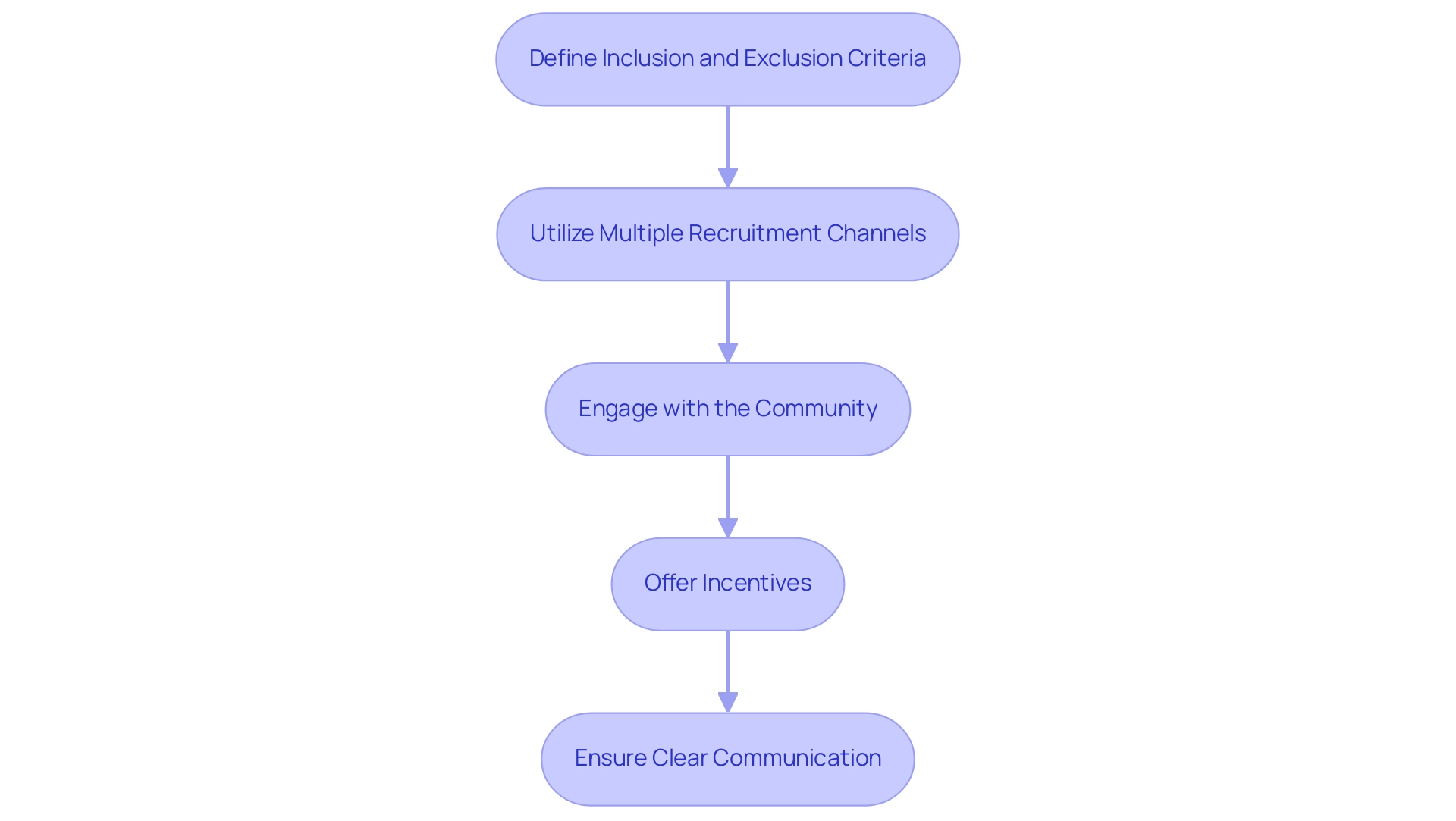
Data Management and Compliance in Pilot Studies
To ensure effective data management and compliance during pilot studies, it is essential to adhere to the following guidelines:
- Implement a Robust Information Management Plan: A comprehensive information management plan is vital. This plan should detail procedures for information collection, storage, and analysis, addressing security measures while ensuring compliance with regulatory standards, particularly those set forth by INVIMA, the Colombia National Food and Drug Surveillance Institute.
- Utilize Electronic Information Capture (EDC) Systems: Embracing EDC systems can significantly streamline information collection processes and reduce error rates. For instance, a study comparing four EDC methods—netbook, PDA, tablet PC, and mobile phone—against traditional paper-based methods revealed that EDC systems could achieve comparable accuracy, albeit with longer collection times. Furthermore, taking into account that the error rate for date fields using telephone interviews was identified as 16.7% (25/150), the implementation of EDC systems becomes even more essential in reducing such errors and improving reliability.
- Ensure Information Integrity: Regular monitoring of accuracy and completeness is paramount. Implementing robust quality control measures can help identify and rectify discrepancies promptly, thus maintaining high information integrity throughout the study.
- Maintain Confidentiality: Protecting participant confidentiality is crucial. This can be accomplished by anonymizing information and restricting access to sensitive details. Furthermore, ensuring that all team members are well-trained in privacy protocols will enhance overall security.
- Conduct Regular Audits: Scheduling periodic audits of data management practices is essential for ensuring compliance with regulatory requirements and internal standards. This proactive method enables the identification of potential issues before they escalate, ultimately safeguarding the integrity of the pilot project.
- Learn from Real-World Examples: The case analysis titled "Adoption of Electronic Data Capture Systems in Canadian Research Projects" found that 41% of research efforts were using EDC systems in 2006 and 2007, indicating a growing trend in the industry. Studies financed by academic institutions were less likely to adopt EDC compared to industry-sponsored studies, showcasing the varying levels of EDC integration based on funding sources.
- Utilize Comprehensive Clinical Research Management Services: Participating in extensive clinical research management services can improve the overall implementation of pilot projects. This encompasses feasibility analyses to evaluate site capabilities, strategic site selection to enhance participant recruitment, and comprehensive compliance reviews to guarantee adherence to INVIMA regulations. Furthermore, efficient trial setup and continuous project management are essential for upholding timelines and reporting on progress, inventory, and adverse events.
Incorporating these best practices will not only enhance data management methods in Pilot Clinical Studies for Medtech in Paraguay but also reinforce the commitment to integrity and confidentiality, essential in advancing medical technology. Furthermore, comprehending the regulatory environment, including INVIMA's supervision as a Level 4 health authority by PAHO/WHO, is essential for ensuring compliance and credibility in research, as highlighted by John Townend.
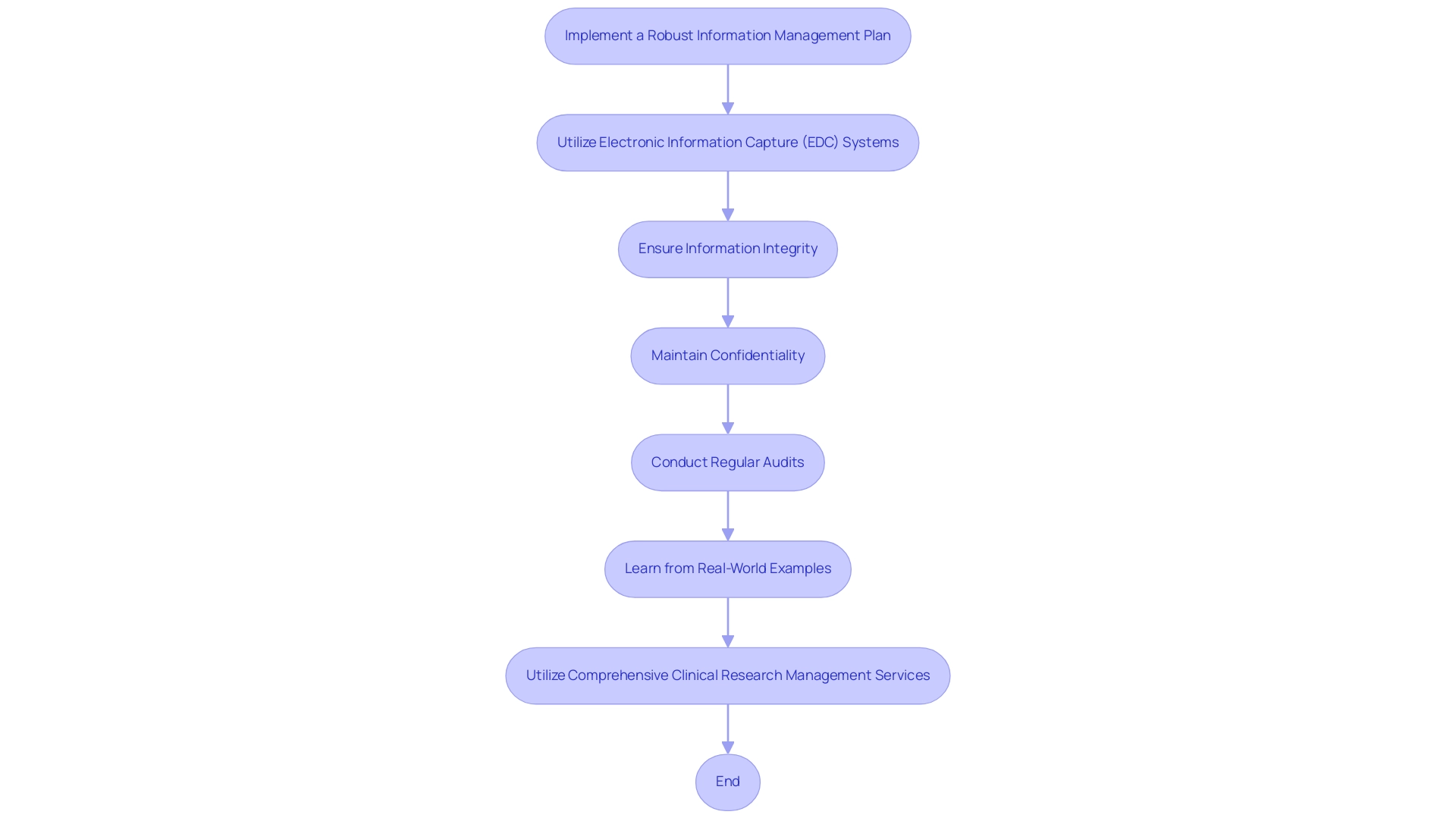
Analyzing Results and Reporting Findings
Effectively analyzing results and reporting findings from pilot medical trials requires a systematic approach, which can be summarized in the following steps:
- Perform Statistical Analysis: Implement appropriate statistical methods, such as the Cox regression model, which is instrumental for exploring and adjusting the effects of baseline risk factors. Utilize advanced software tools for conducting complex analysis to ensure that the results are scientifically valid. The ICH E9 Statistical Principles for Clinical Trials document, sized at 325 KB, provides essential guidelines that further underscore the importance of rigorous statistical methodology.
- Interpret Results in Context: Assess the findings within the framework of existing literature and practical relevance. Discuss how these outcomes contribute to the broader knowledge base and the potential implications for clinical practice, particularly in the context of conducting Pilot Clinical Studies for Medtech in Paraguay, where bioaccess® offers tailored services for navigating unique regional challenges, including Early-Feasibility Assessments (EFA) and First-In-Human Trials (FIH).
- Prepare Comprehensive Reports: Assemble the findings into a thorough report that encompasses the methodology, results, discussions, and conclusions. It is crucial that the report is logically structured for clarity and ease of understanding, adhering to guidelines provided by resources like the EQUATOR Network, which advocates for rigorous reporting of health research studies.
- Share Findings with Stakeholders: Communicate the results to relevant stakeholders, including sponsors, regulatory bodies, and ethics committees. Tailor the presentation to the audience, emphasizing the most pertinent information to facilitate understanding and engagement, and highlight the expertise of bioaccess® in managing these communications effectively, ensuring compliance with local regulations and requirements.
- Publish in Scientific Journals: Aim to submit the research findings to peer-reviewed journals for publication. This not only contributes to the scientific community but also boosts the credibility of the research conducted, as publication rates of pilot study findings in scientific journals can significantly influence future research directions. Leveraging bioaccess®'s established reputation as a vetted CRO can enhance the visibility and impact of your findings, showcasing their flexibility and specialized knowledge in the field.
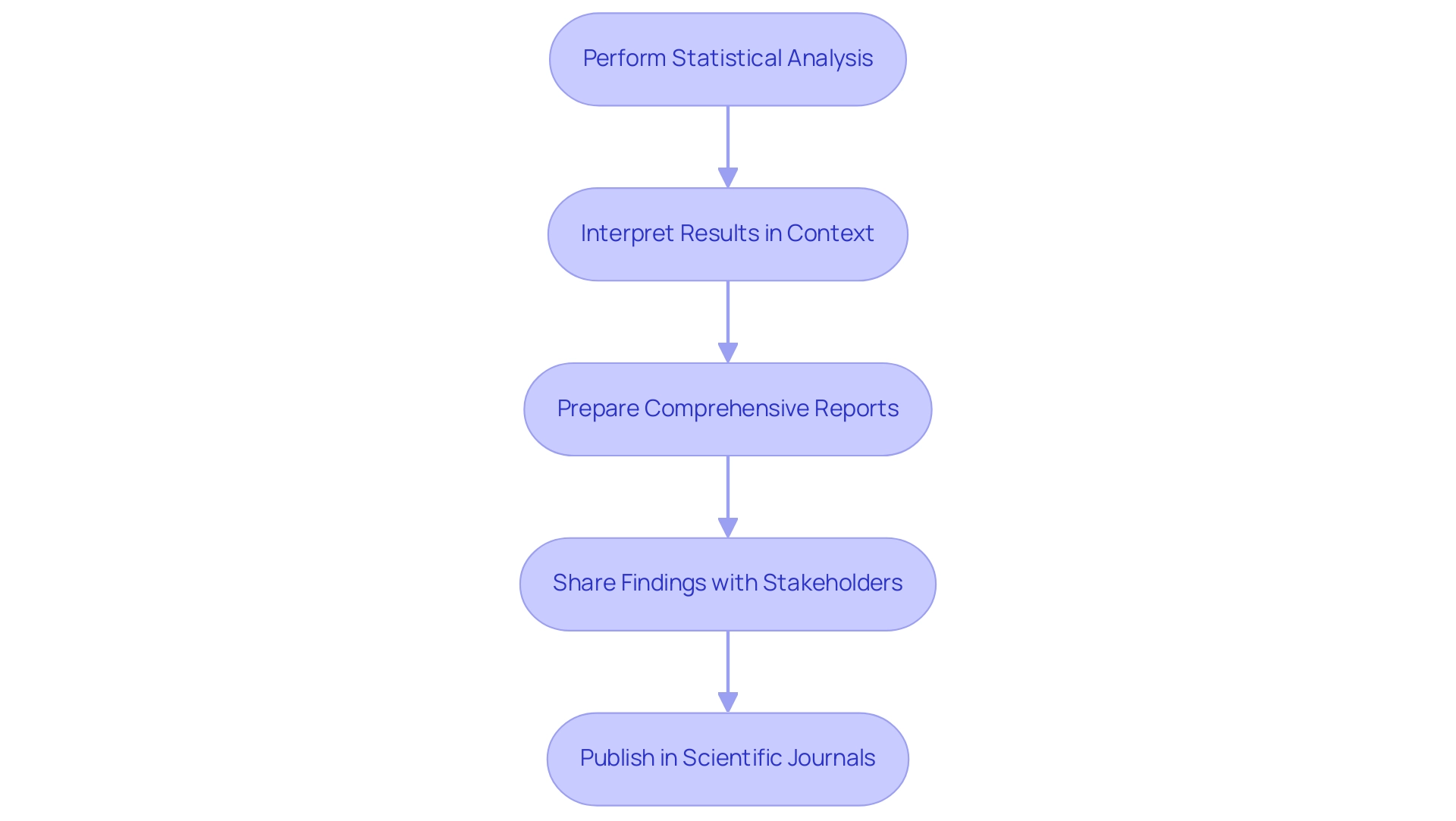
Conclusion
Navigating the complex landscape of pilot clinical studies is essential for the advancement of medical technology. Each stage—from pre-study preparations to reporting and dissemination—plays a critical role in ensuring the study's success. Effective pre-study planning, regulatory compliance, and participant recruitment not only enhance the rigor of the research but also contribute to meaningful healthcare outcomes.
The strategies outlined for recruiting participants and managing data emphasize the importance of thoroughness and transparency. Establishing clear criteria, utilizing multiple recruitment channels, and fostering community engagement can significantly improve participant involvement in studies. Additionally, implementing robust data management practices ensures integrity and confidentiality throughout the research process.
Finally, the significance of analyzing results and reporting findings cannot be overstated. A systematic approach to statistical analysis and clear communication of results to stakeholders is vital for advancing medical knowledge and fostering future research initiatives. By adhering to these best practices and leveraging expert insights, stakeholders can enhance their research efforts, ultimately driving innovation and collaboration in the Medtech field. This commitment to rigor and ethical standards not only promotes successful pilot studies but also paves the way for improved healthcare solutions globally.
Frequently Asked Questions
What are the essential stages involved in pilot clinical trials for medical technology?
The essential stages include Pre-Research Preparation, Research Initiation, Information Gathering, Data Analysis, and Reporting and Dissemination.
What is involved in the Pre-Research Preparation stage?
This stage involves defining research objectives, selecting sites, planning participant recruitment, and creating a detailed protocol outlining the project’s purpose and methodology. It also emphasizes the importance of recruiting a sufficient number of participants for statistically significant results.
What occurs during the Research Initiation stage?
This stage includes training site staff, securing regulatory approvals from INVIMA, and ensuring all materials and equipment are ready for the trial. Effective site management is crucial for maintaining trial quality.
How is information collected during the Information Gathering phase?
Researchers collect information according to the established protocol, emphasizing adherence to maintain data integrity. Focus is placed on descriptive statistics and estimation rather than formal hypothesis testing.
What is the purpose of the Data Analysis stage?
The Data Analysis stage involves statistical evaluation and interpretation of results to assess the efficacy and safety of the medical technology. Surrogate endpoints may be used to provide early indications of treatment effects.
What is reported in the Reporting and Dissemination stage?
Findings are compiled into a detailed report shared with stakeholders, which may include presentations at conferences or publications in peer-reviewed journals. Effective communication of results is vital for advancing medical knowledge.
What regulatory requirements must be adhered to when conducting research trials in Paraguay?
Researchers must obtain authorization from the National Health Authority (ANVISA), ensure ethics committee review, and establish a robust informed consent process, as well as comply with Good Clinical Practice (GCP) guidelines.
How can researchers effectively recruit participants for pilot clinical studies?
Effective recruitment strategies include defining clear inclusion and exclusion criteria, utilizing multiple recruitment channels, engaging with the community, offering incentives, and ensuring clear communication about the study's purpose and risks.
What guidelines should be followed for data management and compliance during pilot studies?
Guidelines include implementing a robust information management plan, utilizing electronic data capture systems, ensuring information integrity, maintaining confidentiality, conducting regular audits, and utilizing comprehensive clinical research management services.
What steps should be taken to analyze results and report findings from pilot medical trials?
Steps include performing statistical analysis, interpreting results in context, preparing comprehensive reports, sharing findings with stakeholders, and aiming to publish in scientific journals to contribute to the scientific community.

